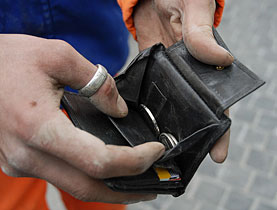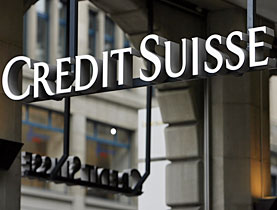Economic barometer hits five-year low

Switzerland's leading KOF economic growth barometer fell to a five-year low in December as exports and consumption declined.
The indicator, which is produced by the KOF Swiss Economic Institute and points to the economy’s likely performance in six months, dropped to -0.39, the lowest level since April 2003 and down from an upwardly revised -0.04 in November.
“Swiss gross domestic product in the first quarter of 2009 can be expected to be lower than in the first quarter of 2008,” the KOF said on Monday.
The decline in the sub-indicator for exports gained momentum, it added. The indicators for the manufacturing sector and for the construction industry and for consumption also fell.
Most economists now see the Swiss economy following its main trading partners such as Germany into a recession.
“[The indicator] is a confirmation of what is widely expected: Switzerland is no exception, the country will follow the downturn elsewhere,” said Credit Suisse analyst Fabian Heller.
The Swiss National Bank (SNB) expects the economy to shrink between 0.5 and 1.0 per cent in 2009 after growing nearly two per cent in 2008.
The SNB has slashed its target rate for the three-month Swiss franc LIBOR (London Interbank Offered Rate) by 2.25 percentage points to just 0.5 per cent since early October and indicated it would turn to unconventional easing measures if necessary to fight the looming recession.
Rajel Khambhaita, an analyst at Informa Global Markets, said global jitters and signs of cooling in the domestic economy had taken their toll and would continue into the first quarter of 2009.
“A 25 basis points rate cut at the SNB’s March meeting seems very likely, if not earlier with the quantitative easing measures likely to come more under the radar screen after that,” he said.
Rough ride
Although 2008 has been stormy for Swiss companies, financial institutions and the economy as a whole, some sectors were still performing well at the end of the year.
Food giant Nestlé posted record sales of SFr81.4 billion ($76.8 billion) in October. Swatch Group started the year with record results and sales were up in the second half even if profits were slightly down. In the pharmaceutical sector, Novartis also unveiled healthy figures while Roche continued to make acquisitions. The luxury goods industry and tourism are cautiously optimistic.
But the construction, car component, chemicals, metals, electronics, manufacturing and machinery industries all displayed signs of stress, not helped by an appreciating Swiss franc that is expected to hit exports.
The franc soared to SFr1.43 against the euro and hit parity with the dollar as investors took shelter with the safe haven currency.
The stock market also took a battering as panicky investors dumped shares and put their cash under the mattress. The Swiss Market Index (SMI) of leading firms lost more than a third of its value in 2008, falling from nearly 9,000 points to under 5,000 between the end of 2007 and November this year.
The free fall has wiped some SFr300 billion from share value in the index. Financial stocks were worst hit, with UBS, Switzerland’s largest bank, losing at one point some 80 per cent in value from 2007 highs.
Uncertain future
On December 21 Swiss Finance Minister Hans-Rudolf Merz said the country might need a third economic stimulus package if the economy failed to recover in 2010.
The government announced a stimulus package of about SFr650 million the week before, its second to counter the crisis, as it forecast Switzerland was heading into its worst recession since 1991.
The State Secretariat for Economic Affairs (Seco) said the economy would shrink by 0.8 per cent in 2009, but recover in 2010 with 1.0 per cent growth.
Merz declined to comment on the size of a possible third package, but said it could be put together relatively quickly.
Seco’s chief economist, Aymo Brunetti, said it was not impossible that the economy would rebound in the second half of 2009 but it was not certain.
swissinfo with agencies
KOF has revised its 2009 GDP growth forecast from 1.8% to 0.3%, but will recover to 1.5% in 2010. It also predicts the economy will grow 1.9% this year, as opposed to its summer forecast of 2%.
The Institute also predicts inflation will fall from 2.6% in 2008 to 1.5% and 1.6% in the next two years. This will allow the Swiss national Bank to lower interest rates in the winter, KOF believes.
Private consumption will also drop from 1.9% in 2008 but remain relatively stable at 1.1% in 2009 and 1.4% in 2010. Part of the reason for this fall would be a less generous wage hike (2.8% for next year) and an increase in unemployment from 2.5% this year to 2.8% and 3.1% in the next two years.
Credit Suisse’s economic research unit paints a somewhat rosier picture, predicting a fall in GDP from 1.9% this year to 1% in 2009.
Inflation should drop from 2.2% (2008) to 1.4% while the rate of unemployment should rise from 2.6% to 2.7%.
The amount of money companies and other institutions invest in expansion projects such as mergers and acquisitions will fall dramatically, Credit Suisse predicts. Such capital investments will drop 1.5% in 2009 compared to this year.

In compliance with the JTI standards
More: SWI swissinfo.ch certified by the Journalism Trust Initiative



You can find an overview of ongoing debates with our journalists here . Please join us!
If you want to start a conversation about a topic raised in this article or want to report factual errors, email us at english@swissinfo.ch.